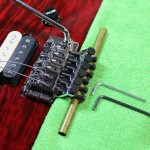I’ve been told that there are two basic strategies for cultivating a weed-free lawn. The obvious method is to go around with a bottle of weed killer and kill all the weeds you can find. Of course, what you get then is a bunch of dead brown spots with little patches of sad-looking grass filling in the gaps.
The other method involves working to encourage the grass to grow healthier, stronger, and thicker, which eventually will crowd out the weeds and leave less room for them to grow. I’ve yet to see evidence of this strategy’s effectiveness in my own yard, but humor me while I stand by this metaphor for a moment.
We Are Trained Weed Killers
We are conditioned to be preoccupied with mistakes, missed notes, out of tune notes, bad sounds – all the things that are “wrong” with our performances. We spend comparatively little time listening for and reinforcing the “right” things. If things sound good, they are pretty much left alone and often, barely acknowledged in practice sessions, lessons, coachings, etc.
We are all weed killers. And the better we get, the worse it usually becomes.
As we become increasingly skilled, we tend to adopt an all-or-nothing view of our playing. In other words, we either miss the note or hit it. If we hit it, we’re satisfied and move on to the next thing. If we miss it we circle back and try again, and again, and again, until we do hit it. Meanwhile, we become increasingly frustrated when we don’t nail it consistently.
But it is true that you either hit the note or miss it, right?
Don’t Neglect What You Did Right
Actually, no. Whether the note comes out exactly the way you want or not is just part of the equation. There were probably several elements in the attempted execution of the note that you did get right. For example (and I use a guitar example since it’s what I know best), in trying to shift up to a tricky high note, you may have lightened up your fingers, loosened up your thumb, prepared your hand shape, but ultimately missed it . Yes, you missed the note, but many other important elements were in place.
Mastery and skill development is a process. There are a series of steps and stages that you must progress through in the learning of any skill. So even though the final product wasn’t what you wanted, some of the elements were executed successfully.
What does it matter? I still missed the note.
The Link Between Focus, Motivation, and Confidence
Ultimately, the way we practice has a more significant impact on our onstage confidence and success than we realize – and often in ways we haven’t begun to consider. Focusing exclusively on the parts of the total equation that you missed, and continuing to be unaware of the “made” parts of the equation not only leads to frustration, but decreases motivation, confidence, and more importantly even the consistency of your ability to execute the skill itself.
Really?
Yes, really. Here’s why.
Confidence
When all you hear and think about is all the stuff you are doing wrong or badly (even though you may be doing almost everything else correctly), your overall perception of success and ability (or batting average if you will), becomes hugely distorted which sends your confidence into a nosedive.
Frustration
When most of your focus is on just the outcome, you fail to get a complete picture of what is happening. As such, you are not fully cognizant or aware of the underlying technical reasons why you are hitting or missing the note. Therefore, your success rate remains unpredictable and you are more than likely just strengthening bad or undesired habits. Not only will this make it feel like you are not making progress (because you aren’t), but is also how we pick up and “learn” bad habits which then appear in critical performance situations.
Motivation
How motivating is it to practice when you don’t feel like you’re making any progress?
Consistency
One of the keys to greater technical control (both in the practice room and onstage) is awareness. If the successful elements of the skill remain out of your awareness and you don’t really know 1) what you are doing right, and 2) what it feels like (kinesthetically, not emotionally) to execute these details correctly, it’s likely that you will not know how to handle yourself onstage when it counts.
By ignoring the details, you are not consciously or deliberately reinforcing those aspects of the skill that are correct and need to be cemented into place for successful execution. In fact, it’s likely that many of the correct elements of a skill are happening by accident.
Ever hear of beginner’s luck? When we try something completely new, it’s not uncommon to actually do ok the first couple times. However, it’s not long before we find ourselves struggling to recreate our initial success, because at that stage in the learning process, we don’t really know what we did that led to our initial success.
This is what happens with child prodigies or “natural” players. They grow up doing quite well based on their instincts and natural tendencies. However, they eventually reach a ceiling, at which time (assuming they want to reach their potential) they need to learn for perhaps the first time in their life how to deliberately control the things they used to do without thinking.
For complete confidence and consistency, you need to know that you know what you’re doing. Yes, that’s a little confusing…read that again slowly if you didn’t quite get it the first time. Ever have the feeling as you close the door to your home that you may have left the stove on? In all likelihood you turned it off, but did so on autopilot, so it wasn’t very strongly embedded into your memory. As a result, your confidence level about whether you left it on or off is not very high. Similarly, if you go through practice sessions on autopilot, there is a part of you that knows you don’t really know what you’re doing, leading to doubt, insecurities, and other onstage…unpleasantries.
When you have practiced consciously, with a high degree of awareness regarding what you are doing, and what it feels like kinesthetically to do things correctly, you are increasing your ability to make greater fine-tuned adjustments on-stage.
Concentration
Last of all, practicing with this degree of deliberate awareness doesn’t only increase motivation and consistency, but it increases your ability to focus and concentrate for longer and longer periods of time. Don’t let the short length of this paragraph lead you to think that this is a lesser benefit. Just know that it is significant.
Stop Throwing the Baby Out with the Bathwater
Just as a patch of dandelions doesn’t mean your lawn is worthless and should be completely ripped up, a note failing to speak, or a passage sounding bad doesn’t mean that everything you did should be thrown out. Save what you can, cultivate it, reinforce it, build on it, and soon you’ll find yourself crowding out all of the “weeds” or undesired elements in your playing and performances, with an increase in motivation and confidence to boot!



